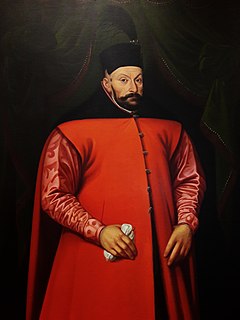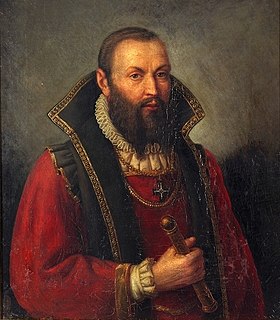 W
WStephen Báthory was Voivode of Transylvania (1571–1576), Prince of Transylvania (1576–1586), King of Poland and Grand Duke of Lithuania (1576–1586).
 W
WGáspár Bekes de Kornyát was a Hungarian nobleman who fought Stephen Báthory for the throne of Transylvania after the death of John II Sigismund Zápolya in 1571. Allied with Maximilian II, Holy Roman Emperor, and the Székelys, Bekes organized two rebellions against Báthory, but was defeated. After Báthory became King of Poland and Grand Duke of Lithuania in 1576, Bekes reconciled with Báthory, becoming his close adviser. Bekes also fought in the Danzig rebellion and the Livonian War.
 W
WJürgen von Farensbach (1551–1602) was a Baltic German nobleman and Livonian general. Sent as the Ambassador of Livonian Confederation to Czar Ivan IV of Russia, for concluding a peace treaty, he entered the Russian service and won the battle on Oka against the Tatars on 1 August 1572. Later he served in the Danish and Polish armies. In 1586 Farensbach gained the rank a senator of the Polish crown granted by Sigismund III, whom he had assisted in gaining the throne of Poland. As field marshal of Poland he fought against the Swedish Empire, where he was killed in the attack on the castle of Fellin on 17 May 1602.
 W
WMarcin Kazanowski, was a noble (szlachcic), magnate, castellan of Halice from 1622, voivode of Podole Voivodeship from 1632 and Field Crown Hetman of the Polish–Lithuanian Commonwealth from 1633.
 W
WGotthard Kettler, Duke of Courland was the last Master of the Livonian Order and the first Duke of Courland and Semigallia.
 W
WFilon Kmita (1530–1587) was a noble in the Grand Duchy of Lithuania and Polish–Lithuanian Commonwealth. Voivode of Smolensk, rotmistrz in the army and starost of Orsha.
 W
WCardinal Bernard Maciejowski, Ciołek coat of arms, Polish nobleman, starosta, royal standard bearer, statesman and Catholic Church leader; Lutsk bishop, Archbishop of Kraków, Archbishop of Gniezno and Primate of Poland.
 W
WMagnus of Denmark or Magnus of Holstein was a Prince of Denmark, Duke of Holstein, and a member of the House of Oldenburg. As a vassal of Tsar Ivan IV of Russia, he was the titular King of Livonia from 1570 to 1578.
 W
WMikołaj Mielecki h. Gryf was a Polish nobleman and politician. Since 1569 Mielecki was the voivod of Podolian Voivodship, between 1578 and 1580 he also served in the Polish Army as the Grand Hetman of the Crown.
 W
WPrince Krzysztof Mikołaj Radziwiłł, nicknamed "Piorun" was a Reichsfürst of the Holy Roman Empire and a member of the nobility of the Polish–Lithuanian Commonwealth.
 W
WMikołaj Radziwiłł, Lithuanian: Mykalojus Radvila also known as Mikołaj Radziwiłł The Seventh (1546–1589) was Reichsfürst of the Holy Roman Empire and a Polish–Lithuanian noble (szlachcic), Great Chamberlain of Lithuania in the Grand Duchy of Lithuania and later in Polish–Lithuanian Commonwealth. Voivode of Nowogródek Voivodeship, starost mozyryski and merecki. Member of the Radziwiłł family. He was a Calvinist.
 W
WMikołaj Radziwiłł, nicknamed The Red, also known as Mikołaj Radziwiłł the Sixth, was a Lithuanian nobleman, Count Palatine of Vilnius, Grand Chancellor of Lithuania, and Grand Lithuanian Hetman in the Grand Duchy of Lithuania and later in Polish–Lithuanian Commonwealth. Together with his cousin Mikołaj "the Black" Radziwiłł and the Radziwiłł family were granted title and position as Reichsfürst Prince of the Holy Roman Empire.
 W
WMikołaj Sieniawski (1520–1584) was a Polish magnate, military commander, Field Hetman of the Crown in 1562–64 and 1575–76.
 W
WStanisław Stadnicki, a Polish nobleman, Lord Starosta of Żygwulsko (Sigulda), a known troublemaker, called 'the Devil of Łańcut' for his violent behaviour. Lord of the castle in Łańcut. Enemy of Jan Zamoyski, Grand Chancellor of the Crown in 1606 he became one of the leaders of the rokosz of Zebrzydowski. From his Łańcut castle he organised many assaults (zajazdy) at the estates of Łukasz Opaliński and Anna Ostrogska.
 W
WJan Sariusz Zamoyski was a Polish nobleman, magnate, and the 1st ordynat of Zamość. He served as the Royal Secretary from 1565, Deputy Chancellor from 1576, Grand Chancellor of the Crown from 1578, and Great Hetman of the Crown from 1581.
 W
WSamuel Zborowski was a Polish military commander and a notable member of the szlachta. He is best remembered for having been executed by supporters of the Polish king Stefan Batory and chancellor Jan Zamoyski; an event which caused much uproar among the contemporary Polish nobility.
 W
WMikołaj Zebrzydowski (1553–1620) of Radwan coat of arms, voivode of Lublin from 1589, Grand Crown Marshal 1596–1600, voivode of Kraków from 1601. He is famous for an armed rebellion against King Sigismund III Vasa, the Zebrzydowski Rebellion, a rokosz named after himself. It took place in 1606, and was defeated by 1607. After the failed rebellion, he sponsored the creation of the Roman Catholic monastery of Kalwaria Zebrzydowska, which is regarded as one of the most important pilgrimage sites of Poland.
 W
WStanisław Żółkiewski was a Polish nobleman of the Lubicz coat of arms, magnate, military commander and a chancellor of the Polish crown of the Polish–Lithuanian Commonwealth, who took part in many campaigns of the Commonwealth and on its southern and eastern borders. He occupied a number of high-ranking posts in the administration of the Commonwealth, including castellan of Lwów, voivod of the Kiev Voivodeship and Great Chancellor of the Crown. From 1588 he was also a Field Crown Hetman, and in 1618 was promoted to Grand Hetman of the Crown. During his military career he won major battles against Sweden, Muscovy, the Ottoman Empire and the Tatars.